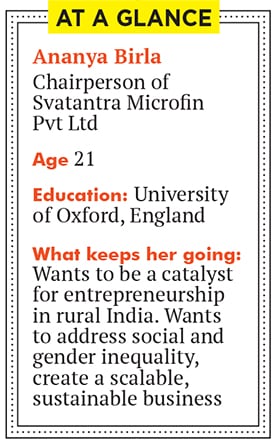
Ananya Birla: Her father's daughter
Through her MFI, Svatantra, Ananya Birla has struck a balance between her need to address social and gender inequality, and her desire to build a business
Ananya Birla believes in following her heart. As a child, she honed her passion for chess to emerge as a champion in school tournaments. As an adult, though she has left the world of competitive chess behind, the life skills she learnt from the game—be it the power of strategy or the importance of patience—have held her in good stead. Today, the 21-year-old is making the right moves in the challenging world of microfinance with the aim of empowering women in the under-served rural areas of Maharashtra and Madhya Pradesh.
Forbes India met up with Ananya on a hot, sultry August afternoon at the plush Aditya Birla Centre in Worli, Mumbai. Her calm and confident demeanour belies her age. But then, she is the third-generation scion of the Birla family, the daughter of Kumar Mangalam and Neerja Birla. A nose for business, and the self-assurance that goes with it, is in her DNA.
Ananya was 17, a student at the University of Oxford, England, when she decided to be an entrepreneur and a catalyst for change in rural India. Like a chess player, she spent a year strengthening her knowledge base, strategising and consulting with experts. She shared her plans with her mother, Neerja, who is known for her philanthropy work.
And, on February 17, 2012, Ananya established Svatantra Microfin Pvt Ltd, a Mumbai-based startup microfinance institution (MFI). Svatantra, which means freedom in Hindi, was officially launched on March 1, 2013.

It’s not every day that children born to privilege—Ananya is the daughter of the 10th richest Indian, Kumar Mangalam (chairman of the Aditya Birla Group)—decide to shoulder such a huge responsibility. With a Master’s in economics and management, she had the option of taking up a job in her father’s group. But she chose to discard that safety net.
“I am passionate about building things; I love to see things grow. I am extremely passionate about startups,” she tells Forbes India. “The way an idea can be built into something big through a business model and impact lives is fascinating.” Through Svatantra, the young entrepreneur has struck a balance between her need to address social and gender inequality, and her desire to build a business.
And she’s not afraid to get her hands dirty: From taking on an idea to creating a business to scaling it, Ananya has taken up multiple roles in her startup. In the early days, she was the company’s field officer, and travelled to remote parts of Maharashtra and Madhya Pradesh where she met with women entrepreneurs to see how best the MFI could serve them.
The initial seed capital of Rs 5 crore was provided by the Birla Group. Since then, Svatantra claims to have received capital from various banks. “Svatantra will repay the Group. I am very grateful and, therefore, that is the least that I can do. It took me one year to get the NBFC-MFI licence (from the Reserve Bank of India or RBI),” she says.
Of course, like any other business, Svatantra experienced its share of ups and downs. For Ananya, the biggest challenge was to get people—peers, competitors, employees, lenders and even customers—to take her seriously. For one, she was a teenager when she decided to set up Svatantra. For the other, she hailed from one of India’s most successful business families. It took a lot of convincing on her part before people realised that she was serious about this business. “I could sense some undercurrents. But giving up was not an option,” she says.
It was not easy on the business side either, despite Svatantra offering one of the lowest interest rates in the industry. It offers livelihood-related loans at 22 percent, compared with standard interest rates of 25-26 percent.
It was also a challenge building clients’ faith in taking loans from Svatantra and to make them understand the firm’s value proposition, which is considerable, she explains: To begin with, it has a 100 percent cashless disbursement through national electronic funds transfer (Neft); it also helps its clients open bank accounts, which is its way of adhering to one of its core missions of financial inclusion; its field officers don’t carry cash, thus reducing cases of fraud which these businesses are susceptible to. The MFI’s website claims it has 44,919 active clients and a total client portfolio of Rs 46.91 crore.
Svatantra also has a financial training module, and is now launching new products like education loans, housing loans and skill development projects. These schemes complement each other and fit in with its vision of wanting to provide an affordable one-stop solution for clients.
Like most seasoned entrepreneurs, Ananya believes that the backbone of any business lies in having the right team. Now that the startup is on a more even keel, she has delegated a lot of the company’s responsibilities to key employees, but remains involved in the hiring process. No one from the initial core team has left the company so far.
She is aware of, and has adopted a practical approach to, the risks of running an MFI. In 2010, the lack of clear regulations and defaults had tarnished the industry. But since then, with more government control, the business has become less risky. It’s still early days but, till date, Svatantra has a hundred percent repayment rate.
Ananya believes that risk can be managed by putting in place the right parameters and setting realistic goals. “We know that defaults are bound to happen. There is no denying that it is a risky business. However, we have a strong risk team. We do frequent internal audits and HR (human resource) checks, and we recruit the best people. I believe having a strong, well-trained, cultured and ethical front end is the key,” she says.
Svatantra claims that it has taken all the precautionary steps to ensure that defaults are controlled. Targets are constantly and periodically reviewed. “I think it is very important to deep dive and understand why the client defaulted. Knowing their reasons and needs makes it that much easier to find effective solutions,” she says.
Currently, Svatantra Microfin has 27 branches in Madhya Pradesh and Maharashtra. Over the next two years, it aims to have more than 100 branches, and a loan portfolio of Rs 600 crore. There are plans to expand to other states, including Rajasthan.
The MFI has a vision— ‘Mission 2020’—which includes plans to have a loan book of Rs 2,000 crore. Through her company, she wants to empower more than 6 lakh women, increase their income and impact their lives in a significant way.
Ananya thinks there is still a long way to go when it comes to micro-lending across India. But she is happy with her startup’s performance so far. “As our customer base is growing, people are beginning to appreciate us. Svatantra is not CSR (corporate social responsibility); it is a for-profit business model where clients pay us back with interest. The idea is to use the profits to plough back into the business to give out more loans,” she says. That said, she does not take any remuneration from Svatantra.
Svatantra is working towards creating what it calls a ‘next-generation MFI’ by introducing innovative technological advancements. These include the cashless disbursement of money (it is also aiming for 100 percent cashless collections), and software to scan the documents of clients and integrate them with the internal system. In the future, it will apply for a small bank licence. “One has to be very realistic. Good things take time,” she says.
Will Svatantra become the microfinance arm of the Aditya Birla Financial Services Group (ABFSG), which is an umbrella brand for all the financial services businesses of the Aditya Birla Group? ABFSG has nine lines of business across life insurance, asset management, NBFC, infrastructure project and structured finance, private equity, broking, wealth management and distribution, online money management, and general insurance advisory services. In February, Aditya Birla Nuvo Ltd was among the first big names to apply to the RBI for licences to run payments banks. It got the licence in August. “I have been working for four years on this venture. Svatantra will remain independent. There is no reason for it to not be,” says Ananya.
A Birla Group insider says there is no plan yet for ABFSG to get into the microfinance sector or merge Svatantra into the financial group. “It will be wait-and-watch for at least the next three years. Most likely, Svatantra will remain an independent entity for some more time.” he says
Ananya is ready with her next venture too: She will be launching an ecommerce platform within six months, though she is not ready to share more details. “I want my bite to be bigger than the bark,” she says.
In her free time, Ananya immerses herself in music, both western and Indian classical. She plays the guitar and the santoor. She loves poetry and often expresses herself by composing her own music. “I follow my heart and it seems to be working so far.”
You cannot take the Birla out of Ananya. “Work hard, laugh hard.” That’s her motto. “My parents have always given me their unconditional love and support. It fuels my ambition. Hopefully, I will do justice to the family legacy,” she says with a smile.
(This story appears in the 30 November, -0001 issue of Forbes India. To visit our Archives, click here.)






